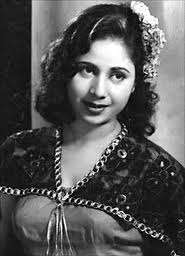Geeta Bali
| Geeta Bali | |
|---|---|
 | |
| Born |
Harikirtan Kaur 1 November 1930[1] Sargodha, Punjab, British India (present-day Punjab, Pakistan) |
| Died |
21 January 1965 (aged 34)[2] Mumbai, Maharashtra, India |
| Years active | 1950-1964 |
| Spouse(s) | Shammi Kapoor (m. 1955) |
| Children | 2, including Aditya Raj Kapoor |
Geeta Bali (1 November 1930 ‒ 21 January 1965) was a popular film actress from Bollywood. She was considered one of the most spontaneous and expressive stars of Bollywood for her acting.[2]
Early life
Geeta Bali was born in the pre-partition Punjab in the city of Sargodha in Pakistan as Harkirtan Kaur in 1930.[1] Her family moved to Mumbai when she started to get breaks in films.
Career
Geeta Baali started her film career as a child actress, at the age of 12, with the film The Cobbler. She made her debut as a heroine in Badnaami (1946).[3]
Bali became a star in the 1950s. She had also worked earlier with her future brother-in-law Raj Kapoor in Bawre Nain (1950) and with her future father-in-law Prithviraj Kapoor in Anand Math. Unlike other actresses who gave up films after marrying into the Kapoor family, Bali kept acting until her death. Her last film was Jab Se Tumko Dekha Hai in 1963. She did more than 70 films in a 10 year career.[2]
Bali helped Surinder Kapoor become a producer.[4][5]
Personal life
Her family lived in Amritsar before 1947. Her father, Kartar Singh was known as a philosopher . He was a Sikh scholar and kirtan (Sikh devotional music) singer. Her maternal grandfather, Takhat Singh (1870-1937), was the founder of Sikh Kanya Mahavidyalay - a boarding school for girls and the first of its kind established in 1904 in Ferozepur. Her elder brother DigVijay Singh Bali was a film director. He directed the movie Raag Rang starring her and Ashok Kumar in 1952.The parents encouraged their daughters, Harkirtan (Geeta Bali) and Hardarshan, to learn classical music and dance, horse riding and gatka fencing. Fundamentalist Sikhs socially boycotted the family as they did not like the girls performing in public and they picketed the theatres. [Source: Amar Bharti interviewed by Amrita Pritam, Nagmani December 1982]
On 23 August 1955, Geeta married Shammi Kapoor, with whom she was working in the film Coffee House.[6] They had two children, a son (Aditya Raj Kapoor) and a daughter (Kanchan).[2]
She died on 21 January 1965, having contracted smallpox while shooting a Punjabi film, Rano, based on a novel Eik Chadar Maili Si by Rajinder Singh Bedi. He was directing the film and she was the producer. Bedi, devastated by the untimely death of Bali, abandoned the project. He wrote later that he had put the novel, Ek Chadar Maili Si, on her burning funeral pyre.
She is the aunt of Yogeeta Bali. Shammi Kapoor married Neela Devi after her death.
Filmography
Her films include Sohag Raat (1948) with Bharat Bhushan, Dulari (1949) co-starring Madhubala; then as the spoilt younger sister in Badi Bahen (1949) co-starring Suraiya, Rehman and Pran, Bawre Nain (1950) with future brother-in-law Raj Kapoor, Baazi (1951) with Dev Anand, Ghayal (1951) with Sheikh Mukhtar, Albela (1951) and Jhamela (1953) with Bhagwan Dada, Jaal (1952) with Dev Anand, Baaz (1953) with Guru Dutt, Bara Dari (1955) with Ajit, Jailor (1958) and Mr. India (1961),kashti(1954) with Dev Anand . She received a Filmfare Nomination as Best Actress for Vachan (1955) and another nomination as Best Supporting Actress for film Kavi (1955). One of her memorable movies is Anand Math.
References
- 1 2 Adrian Room (26 July 2010). Dictionary of Pseudonyms: 13,000 Assumed Names and Their Origins. McFarland. pp. 44–. ISBN 978-0-7864-4373-4. Retrieved 22 April 2012.
- 1 2 3 4 Dinesh Raheja. "Geeta Bali: That Amazing Vivaciousness". Rediff.com. Retrieved 9 May 2018.
- ↑ Subodh Kapoor (2002). The Indian Encyclopaedia: Gautami Ganga -Himmat Bahadur. Cosmo Publications. pp. 2575–. ISBN 978-81-7755-266-9. Retrieved 22 April 2012.
- ↑ "'Sonam Kapoor is a better actor than Anil'". Rediff.com. Retrieved 9 May 2018.
- ↑ Pandya, Sonal. "10 things you didn't know about Geeta Bali". Cinestaan. Retrieved 2018-06-30.
- ↑ Ramesh Dawar (1 January 2006). Bollywood Yesterday-Today-Tomorrow. Star Publications. pp. 1–. ISBN 978-1-905863-01-3. Retrieved 22 April 2012.